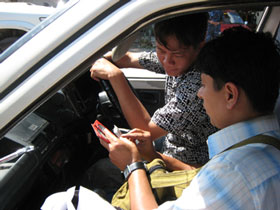
Buy a Condom While You Wait at the Fuel Pump in Nepal

Kathmandu, Nepal – At an intersection in Naxal, near the center of Kathmandu, a string of motorcycles winds through a pack of parked cars. It is hot and dusty and drivers are getting impatient. A strike by petrol (fuel) truck drivers coupled with unpaid bills to the Indian Oil Corporation have essentially shut off Kathmandu’s petroleum supply. The limited supply trickles into petrol stations periodically causing massive lines of customers anticipating the supply. A police-owned petrol pump in Naxal just received a shipment of petrol. For hours the motorcycles and cars have been lining up – drivers sit waiting for the pumps to start. This has been the story for weeks across the Kathmandu Valley.
The implementers of USAID’s Nepal Social Marketing and Franchise Project (N-MARC), the Academy for Educational Development and its partner, the Nepal Contraceptive Retail Sales (CRS) Company, have seen opportunity in this dire situation and are taking action. Taxi and truck drivers fill petrol lines. Due to their mobility, which brings higher potential for contact with non-regular sex partners, these drivers are among Nepal’s most at-risk populations for HIV infection. N-MARC seeks to promote condom use among taxi and truck drivers to prevent a spread of the HIV epidemic in the general population of the Nepal.
CRS hired and trained Soorya Trade Concern (STC), a local NGO, to facilitate face-to-face interventions with the taxi and truck drivers in the queue. STC had conducted similar activities for CRS in the past and quickly commenced its work at the Naxal queue.
Starting at the front of the line, STC team members knock on windows and enter the cabs, sitting next to the driver in the front seat. After introducing themselves, STC team members start a conversation about condom usage and ask drivers what they know about HIV/AIDS. In one cab, the driver acknowledges that he knew about the disease but is unsure how it is transmitted. “It is a sexually transmitted disease that you can prevent the spread of through the correct and consistent use of condoms,” notes the STC educator. He adds that correctly using a condom not only reduces the risk of transmission of HIV/AIDS, but it also reduces risk of contracting other sexually transmitted infections (STIs). Concluding a two-way conversation aimed at reducing myths and misconceptions about STIs and condom use, the educator moves on to the next taxi.
An investment of just under $500 allowed the two-man STC team to canvas queues across the Valley over several weeks. They distributed condoms and leaflets to over 1,000 taxi drivers, truck drivers and uniformed personnel waiting in these lines.
CRS and STC are observing the petrol situation closely, in order to respond to line opportunities as they form in the coming months. Due to the inconsistency of the situation, it is difficult to plan targets; however, the team is on constant alert for rapid on-the-ground implementation as soon as an opportunity arises. The N-MARC team is also investigating scaling up the intervention outside the Valley, where the petrol situation is similar. Beyond distribution of samples, the face-to-face interventions allow N-MARC and its partners to reach members of a community that is particularly important in the fight against the spread of HIV/AIDS in Nepal.
Posted February 2008
Read more about the Nepal Social Marketing and Franchise Project (N-MARC) project